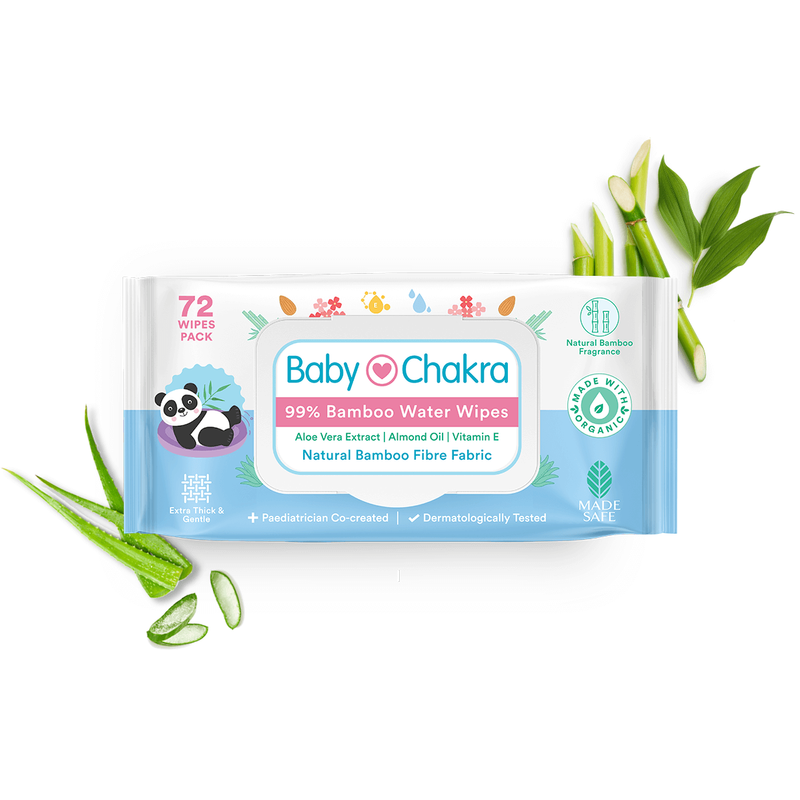
Here’s Why Your 7-Month-Old Baby Might Be Vomiting Solids
23 Jun 2022 | 4 min Read
Sayani Basu
Author | 607 Articles
From birth to 12 months it’s common for infants to vomit. Although vomiting is normal for babies, it can be worrying for parents. Occasionally, it can be a sign of illness or complications, but for most babies, vomiting, and reflux occur simply because their guts are still developing.
Usually, vomiting is short-lived and stops after some time. However, severe or prolonged vomiting can also cause dehydration. If not treated, dehydration can be life-threatening.
There lies a difference between a baby vomiting and just spitting-up milk. Spit-up usually happens soon after feeding and is often accompanied by a burp. It looks like a milky-white dribble (Keeping organic and natural wet wipes handy for such situations might be a good idea).

Can Solids Cause Vomiting?
Babies can take time to adjust to digesting solid foods and can vomit more when solids are introduced. This can also occur because of overfeeding.
Since their stomachs are simply too small to accommodate the extra volume, it is advisable for mums to start small when introducing solids – around one to two teaspoons of solids. A tummy relief roll-on made of all-natural ingredients is recommended to provide instant relief to your baby from discomfort caused due to constipation, gas, or colic.
Some allergies can also cause vomiting, especially allergies to cow’s milk. The little one can react to particular foods or ingredients if they’re sensitive to them.
It is recommended to consult your doctor as they can guide you to decide which foods are best for the little one.
Causes of Vomiting Solids
Here’s why your seven-month-old baby might be vomiting solids:
- Infant reflux: Just like adults can have acid reflux or GERD, some babies can also have infant reflux that can lead to vomiting.
Vomiting from acid reflux happens when the muscles at the top of the stomach are too relaxed and this triggers baby vomiting shortly after feeding.
Usually, the stomach muscles strengthen, and your baby’s vomiting goes away on its own. You can also help slow down the vomiting by:
- Avoiding overfeeding and giving smaller, more frequent feeds
- Burping your little one often
- Propping your baby up in an upright position for 30 minutes after feeding
- Gastroenteritis: Gastroenteritis is also known as the tummy bug or “stomach flu,” and is a common cause of vomiting in babies. It is caused by a virus that goes away by itself within a week.
Your baby might have cycles of vomiting that come and go for about 24 hours.
Severe gastroenteritis can also lead to dehydration. It is advisable to consult a doctor immediately if your baby has any signs of dehydration:
- Dry skin, mouth, and eyes along with unusual sleepiness.
- No wet diapers for eight to 12 hours.
- Weak cry or crying without tears.
- Meningitis: Meningitis is an infection of the protective linings that surround the brain and spinal cord and is common in babies.
It can cause life-threatening blood poisoning or brain damage.
Besides vomiting, the baby also gets a fever over 37.5 degrees Celsius, a severe headache, and aching limbs.
- Intussusception: Intussusception is a condition that occurs when one segment of the intestine ‘telescopes’ inside another resulting in a blockage.
According to medical reports, intussusception is common in babies and leads to vomiting solids.

How Can I Treat My Vomiting Baby?
Usually babies recover quickly after vomiting and don’t need any specialised care. However, if they vomit a lot and have other symptoms, it is advisable to consult a doctor.
Mostly, babies are not given medication for vomiting unless they can’t keep any milk or fluids down.
Changing feeding positions and frequency can reduce the likelihood of vomiting in babies.
Dr. Pooja Marathe, Community Expert – Lactation & Nutrition says, “Babies vomit solids due to overfeeding. Hence, mums can thicken their babies’ formula. But be careful and do not use too much cereal or else the milk will become too thick. One teaspoon for every 2 ounces is good enough.”
Your seven-month baby might vomit solids because of several common illnesses. Most of these causes go away on their own, and your baby will stop vomiting without any treatment. So. there’s nothing to worry about. Enjoy your baby’s growth milestones!
A


Suggestions offered by doctors on BabyChakra are of advisory nature i.e., for educational and informational purposes only. Content posted on, created for, or compiled by BabyChakra is not intended or designed to replace your doctor's independent judgment about any symptom, condition, or the appropriateness or risks of a procedure or treatment for a given person.


